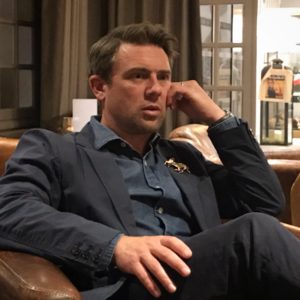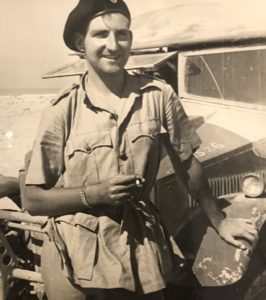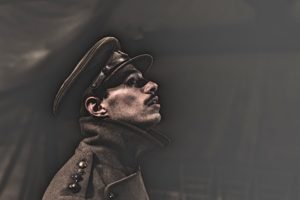A great tragedy, according to playwright Owen Sheers, is that each time we head towards war we suffer a national amnesia about the detail and awfulness of past conflicts.
This was one of the motivations for writing Unicorns, Almost, a one man play being presented by The Story of Books as part of this year’s Army@TheFringe programme, in association with Summerhall.

It tells the story of one of the greatest poets of World War II, Keith Douglas, who recovered from the wounds he suffered during the struggle in the Western Desert only to be killed, aged 24, three days after the D-Day landings.
Owen, a multiple award winning novelist and poet and BAFTA nominee, sees Douglas as someone with a remarkably modern voice and a powerful resonance today.
He describes him “a soldier through and through”. During El Alamein he had a nice safe desk job, but felt that was wrong, so he stole a truck and went to the front. He was welcomed when he got there because so many of the other officers were dead.

But there was nothing “king and country” about the man, no easy nationalism. He simply saw that we had to beat the Nazis.
Indeed did all he could to humanise his enemies. In Vergissmeinnicht (forget me not) he described discovering the corpse of a German soldier who had tried to kill him, lying beside a photo of his lover – the name Steffi written in gothic script.
Owen is well known for theatrical work including The Two Worlds of Charlie F, about the experience of British veterans wounded in Afghanistan,which won the Amnesty International Freedom of Expression Awardwhen it came to the Fringe in 2012.
In that production there would be military veterans and anti war protestors sitting beside each other. All of them wanted wanted the unflinching truth about war. He hopes Unicorns, Almost will appeal to a wide range of people as well.

For the first part of its run Unicorn’s, Almost will be presented as an audio play and art installation – listen here . For the second part it will be a live performance with Dan Krikler (whose performance was praised as “wonderful” by Margaret Atwood) as Keith Douglas.
It presents the poet as a man who makes a Faustian pact with the war – it gives him his voice, accelerates his artistic development, allows him to achieve his dream of seeing his work accepted for publication and then takes his life.
And like some of Owen’s other work, it is as much about today as about World War II.His career has paralleled the post 9/11 conflicts, and he says that what strikes him time and again is that while we say we’ll always remember, we quickly forget how terrible each war was. We go out and do it again and again. We are not learning very much.
He hopes thatwriters and performers can act as a counter to the anonymising force of conflict – and that this was one of Keith Douglas’ great capacities.
In Owen’s words: “There was something very dramatic about him. It’s like he grabbed your head and made you look at the reality.”
- If you’d like to know more then you can visit our website www.Armyatthefringe.org.

































